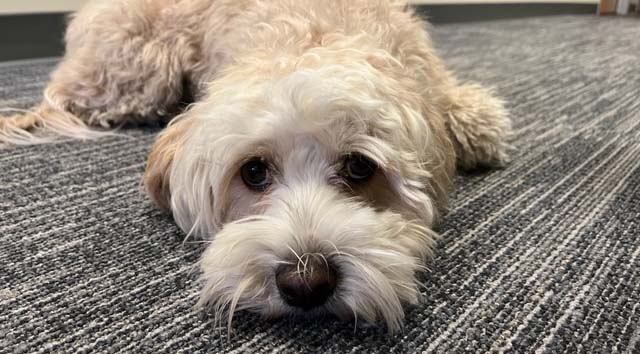Luna Loves Everybody. Especially You.
How SDSUs new therapy dog was trained without the benefit of contact with students.

“What we hear often is how much joy she brings to students.”
When therapy dog Luna enters the room with her sandy curls or bounces across campus with a spry step, problems seem to melt away — or at least recede for a time.
But just like many students, Luna is new to the San Diego campus and still transitioning from learning at home.
It’s been more than 18 months since a generous donation paved the way for San Diego State University to adopt Luna, a Cavalier King Charles Spaniel/poodle mix, who joined Baxter as SDSU’s second therapy dog. The floppy-eared pooch is four months into her first semester on campus.
“She's doing great!,” said Cristina Antonucci, Luna’s caretaker and a licensed psychologist with the Department of Counseling and Psychological Services. “She loves being on campus, gets excited every morning to come to work — so much so that she is becoming known for carrying her own leash and walking herself into the office. She gives folks the chance to have a little decompression break throughout the day.”
James Rostello, a teacher from Kansas who retired to San Diego in 2005, paid for Luna’s adoption fees, training, supplies, food and upkeep, and he also pledged a $200,000 gift to provide therapy dogs for future generations of Aztecs.
Rostello is not surprised Luna is thriving on campus.
“It confirms what I know about dogs; their love is unconditional,” Rostello said. “It was a unique situation when someone stepped to the plate to give love and care to (Luna). I wouldn't have given the dog to just anyone. They (SDSU) really wanted her, and they’ve done well with her.”
Luna’s road from carefree puppy to therapy dog was altered by the pandemic but, in some ways, the pandemic made her training easier, Antonucci said.
“We had more one-on-one training time with fewer distractions,” they said. “The only tough part was that she spent a lot of time with me and not as much time with others due to quarantine.”
That lack of contact with other people was going to be the big hurdle when it came time to return to campus. Antonucci said they prepared Luna for the big day by taking her out as much as possible.
“We knew it would be an adjustment, but I wasn't too concerned. She is a quick learner and loves people,” Antonucci said. “There was a lot of repetition, trial and error, and exploration. I took her to as many places as I could to help her get familiar with different sounds, people and environments.”
Luna's world
This fall, Luna has been all over campus, including to several classrooms, crisis debriefings and outreach events. She also has a few standing commitments, such as Lunch with Luna at Scripps Cottage on Tuesdays and Lounge with Luna at the Pride Center on Thursdays.
Marisa Krauter, a senior psychology major, is an advanced peer education with Counseling and Psychological Services who works with Luna at Lunch with Luna.
Krauter said she sees the impact Luna has on fellow students firsthand, as the playful pup puts a smile on their faces.
“I think she provides some good emotional support, especially during stressful times, around finals and midterms,” Krauter said. “And also, a lot of students are homesick, missing their own dogs, and her presence really helps them too.”
Luna’s energy is a welcome contrast to her relaxed big brother Baxter.
“I think she is really friendly, she really likes to interact with anyone, she’s really playful,” Krauter said. “Students will bring balls or toys and she will play fetch, she has a lot of energy. Baxter is pretty chill, he sits around a lot. They are a little different.”
Baxter and Luna’s presence on campus, like therapy dogs across the world, has been backed up by numerous studies touting the positive psychological and physiological effects of animal-assisted interventions and therapy, including the release of serotonin, prolactin and oxytocin — all hormones that can play a part in elevating moods.
This week, Luna and Baxter are available to help relieve students’ stress as they study for finals.
“She enjoys getting 'pup cups' from the coffee carts, spending time with students and posing for photo ops,” Antonucci said. “What we hear often is how much joy she brings to students, how happy she is to be interacting with students and how much personality she brings to any given situation.”



